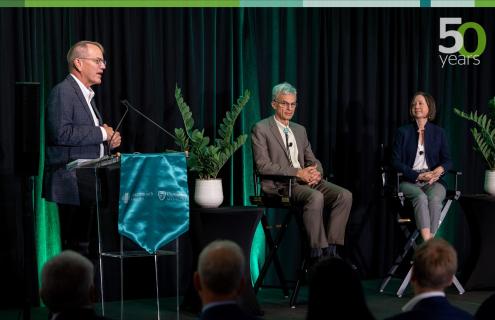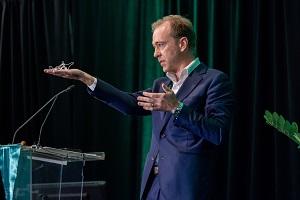
Our collective goal is to develop next-generation immunotherapies that are highly effective and well tolerated by patients.
Tyler J. Curiel, MD, MPH, FACPGrowing attention to immunotherapy for cancer would make it seem like a modern discovery. But interestingly, the concept was first explored in the 1800’s. Since then, scientists worldwide have asked, if the body’s immune system can kill off bacteria, viruses and other invaders, how can we harness its abilities to kill cancer cells?
Excellent progress has been made, and many once-deadly adult and childhood cancers now have FDA-approved immunotherapies available. Nonetheless, the full potential of immunotherapy has hardly been exhausted. Discoveries continue to be made almost daily, including here at Dartmouth Cancer Center, where novel immunotherapies are in late stages of development.
“Our collective goal is to develop next-generation immunotherapies that are highly effective and well tolerated by patients,” says Tyler J. Curiel, MD, MPH, FACP, who joined Dartmouth Cancer Center to lead the expansion of cancer immunotherapy research and clinical trials.
Curiel’s own research efforts center on overcoming treatment resistance barriers to immunotherapy. Two drugs discovered by the Curiel lab are entering clinical trials, while previous novel drugs from the team have progressed with industry partners. “Leveraging existing knowledge is paramount to further discovery in immunology and immunotherapy,” he says.
Knowledge, such as the features of memory T cells—potent immune cells whose action can result in durable and sustained cancer cures—helps move towards the goal of cure. “Defining the drivers of memory T cell fitness and function across tumor and tissue environments will allow us to engineer broadly distributed, lasting, cell-based therapies,” says Mary Jo Turk, PhD, co-director of the Immunology and Cancer Immunotherapy Research Program at Dartmouth Cancer Center, whose current research focuses on optimizing memory T cells. “In the next five years, research teams including ours expect to advance a potent new class of therapies that successfully ‘seed’ protective memory T cells across tissues where cancers grow and spread.”
Cell by cell
Dartmouth investigators contributed to the first large-molecule antibody-based immunotherapies for cancer. Now, investigators look to the many critical immune pathways that can be altered by small-molecule drugs, which can also more easily be formulated as oral medications. Early studies in Dartmouth Cancer Center laboratories have already shown potential for a new class of small-molecule immune-stimulatory drugs to treat a wide range of cancer types.
In addition, the laboratory of Claudia Jakubzick, PhD, made a radical discovery that antibody-producing B cells, not previously thought to contribute much to cancer immune responses, are in fact, critical for controlling cancer growth. Leveraging B cell potential also opens a whole new treatment pathway.
Fueling innovation
Although a new era of cancer immunotherapy is revolutionizing treatment strategies, fewer than one in five cancer patients respond to current immunotherapies. New immune profiling methods hope to improve that statistic by predicting a patient’s response to immunotherapy and by helping develop better immunotherapies.

With support from the Dartmouth Innovations Accelerator for Cancer, researchers Lucas A. Salas, MD, PhD, and Brock C. Christensen, PhD, are developing novel immune profiling technology that allows for the detection of immune response in patients receiving immunotherapy potentially before changes in tumor size can be seen on X-ray or other imaging. “A clinical trial is underway where we hope to study every single patient in the Dartmouth Health system receiving immunotherapy using this technique,” says Christensen.
CAR T cell therapy
The Blood and Marrow Transplantation Program team at Dartmouth Cancer Center opened the first and only program in northern New England to treat patients with an emerging form of immunotherapy called CAR T cell therapy. This FDA-approved therapy involves genetically engineering a patient’s own T cells to recognize, attach to and kill cancer cells. The program has now treated more than 20 patients in three years, with most experiencing remission in lymphomas and multiple myelomas that are resistant to other treatments.
Meanwhile, discoveries in Dartmouth Cancer Center laboratories continue to improve CAR T cells. For example, Yina H. Huang, PhD, and her team are looking to expand CAR T cell therapy across a broader range of tumor types than current CAR T cells, which only target blood cancers. The Huang lab is also advancing the use of armored CAR T cells that do not require chemotherapy to suppress a patient’s immune system before infusion of CAR T cells.
The goal is to accelerate bench-to-bedside research by bringing CAR T cell innovations to patients through early-phase clinical trials. Several of these trials are already in progress.
The pursuit of next-generation immunotherapy offers high potential to impact humans. Building on its entrepreneurial roots, our cancer center is rallying the best of Dartmouth College and Dartmouth Health—scientists, physicians, nurses, engineers and students—to harness the power of the immune system and launch new treatments for those who need them most.